The Third World Philanthropy Studies Forum was held in Wuzhen, Zhejiang Province on March 30-31, 2019. This forum was jointly organized by NGO Research Center of Tsinghua University, Institute for Philanthropy of Tsinghua University, School of Public Affairs (SPA) of Zhejiang University, Institute for Civil Society Development of Zhejiang University and Zhejiang Hongshi Foundation. Themed “New Philanthropy and Rural Revitalization”, the forum brought together more than 80 experts and researchers from Mainland China, Taiwan and America, government officials as well as representatives from philanthropy circle.
On the afternoon of 30th, experts and professors made a tour at Tongxiang, Zhejiang, visiting the courtyards and farmyards designed by villagers as well as the exhibition wall of rules and regulations. Tongxiang is the pioneer in implementing innovative “Three Governance” policy, i.e. integration of governance by self, governance by law and governance by virtue. Currently, Tongxiang is marching towards a prosperous and civil modern village with effective governance and pleasant environment.
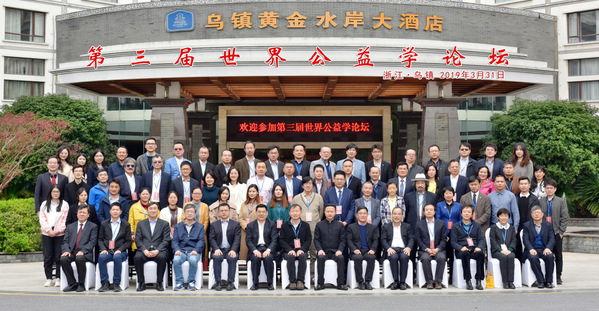
The opening ceremony of the forum, featuring three speeches, was held on the 31st am and presided over by Wang Ming, Chair of Institute for Philanthropy of Tsinghua University. Secretary of Tongxiang City Committee of the CPC introduced Tongxiang’s economic, social and natural environment and shared the experience of rural development. The opening speech given by the Deputy Dean of School of Public Policy & Management (SPPM) of Tsinghua University presented how philanthropy develops in China and benefits rural areas, and how SPPM contributes to the R&D of philanthropy in China; Dean of SPA, ZJU introduced how Zhejiang University promoted local governance and expressed the willingness to cooperate with other universities on the research of philanthropy.
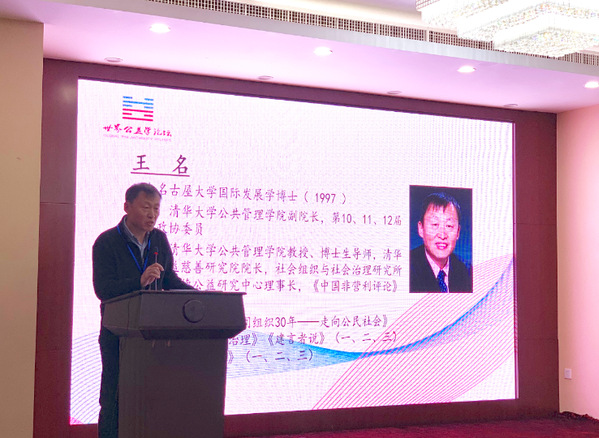
Chair of Institute for Philanthropy of Tsinghua University hosted the opening ceremony
The first event of the forum was the founding ceremony of Zhijiang Philanthropy Academy. During the ceremony, directors of Zhejiang Civil Affairs Bureau and professors from Zhejiang University and Peking University were invited to deliver speeches. The Academy will be an international organization for intellectuals to plan events, conduct seminars and exchange information to promote charity practice. Based on the Yangtze Delta, it is expected to become an influential one with the integration of study space, R&D platform and practice field. Zhejiang provincial government has constantly encouraged research and practice of philanthropy, and therefore promoted the grass-roots social governance and the rural development. So far, there were 694 charity foundations and 705 certified social organizations in Zhejiang province.
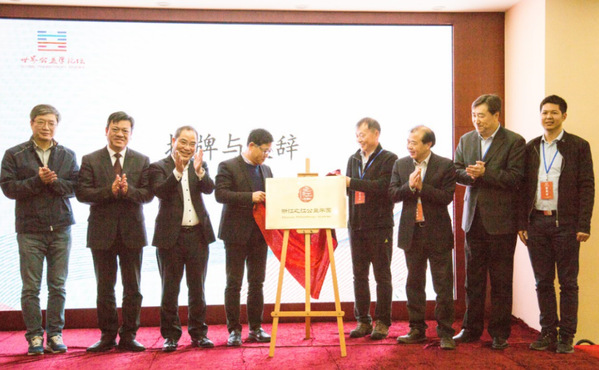
Founding ceremony of Zhijiang Philanthropy Academy
As for the second event, Bai Hong, the Executive Director and General Secretary of China Alliance of Social Value Investment (CASVI) was invited for a keynote speech. Bai highlighted CASVI’s attempt to construct a widely-accepted social value assessment model that would not violate current commercial rules, nor would it confine current commercial models based on preconceived values. Instead, the model will encourage quantitative expansion rather than quality enhancement, and improve production technology, operation modes and management mechanism. This model will evaluate public companies based on profitability and social and environmental contribution.
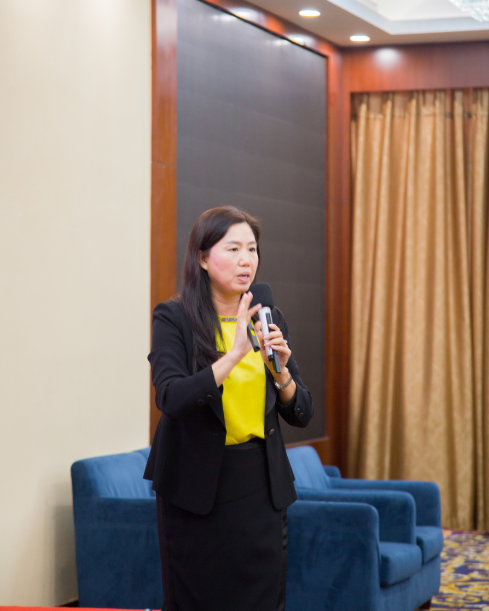
Keynote speech delivered by Executive Director of CASVI
The third part was the theme forum. The first session, featuring two keynote speeches and a round table discussion, was hosted by Shen Yongdong, a researcher of “Hundred Talents Program” and the Deputy Chair of Academy of Social Governance, Zhejiang University. Director of Global Village of Beijing delivered the first keynote speech, in which he shared the experience of curricular design and teaching base construction in rural areas, and analyzed the relations among Confucianism, politics and education. Several professors and experts raised questions, covering the tension between traditional Chinese cultural forms and modern lifestyles, the function of charity organizations in reality and the charity practice in rural areas in China.
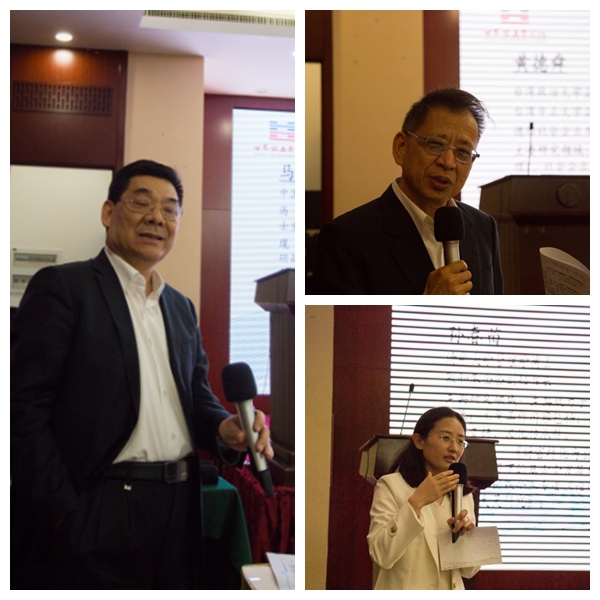
Discussions on the second keynote speech
The first round table was present by professors from China Academy of Art, Zhejiang University and Soochow University shared their individual opinions on philanthropy. Firstly, Professor Wu Jiebing from Zhejiang University analyzed the relation between philanthropy and autonomy, and mentioned the development of the two should complement each other. Professor Zhang Chao from Soochow University believed that charity and philanthropy were different. The latter has a broader scope, including the main actors and action strategies. Besides, public space was far more than physical space; virtual space should be regarded as a new channel for public participation. Finally, Professor Song Jianming stated five key points of philanthropy promoting rural development.
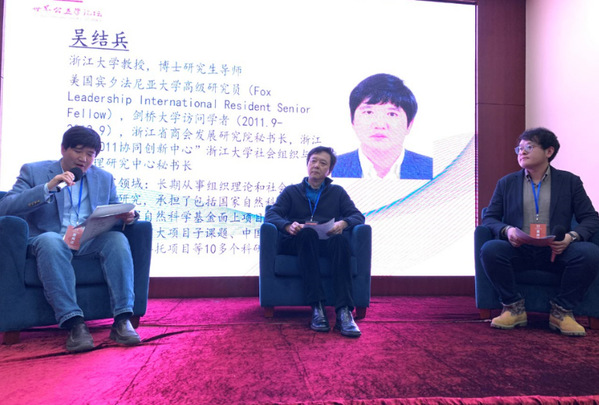
Round Table 1
The second theme forum was about “Internet + Charity”, which was chaired by Associate Professor Zheng Shengfen from National Taiwan Normal University. This forum began with a keynote speech titled ‘Study on the Charity Innovation Model Based on Blockchain’ by Zhang Nan, a post-doctor from Institute for Philanthropy Tsinghua University. Lack of trust and insufficiency of resources were main problems for the current charity in China, but the features of blockchain could reconstruct a trust mechanism to tackle issues about information disclosure and transparency. Zhang explained how blockchain potentially affected the transformation of charity organizations in the case of Fun in Funding (a crowd-funding platform based on social network).
Professors from National Taiwan University, Soochow University and Tsinghua University gave comments on the study and pointed out potential obstacles that blockchain might be confronted in the field of philanthropy. Although much work had been done on its theoretical framework, several issues required further positivist consideration due to the immature research on blockchain, such as ‘to what extent could blockchain affect charity practice?’ and ‘how to strike a balance between information transparency and privacy protection’. Other issues were about the data authenticity and the implementation of relevant laws and regulations.
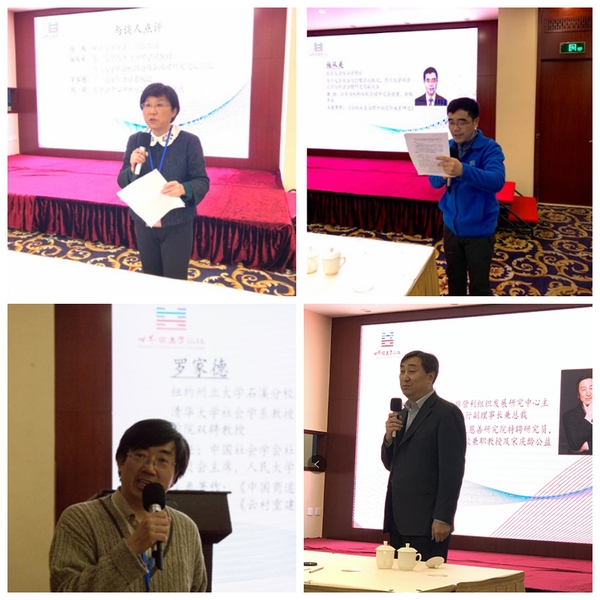
Discussion on the blockchain and charity practice
The second keynote speech was entitled ‘Internet and Social Enterprise Development’. The speaker was Professor Miao Qing from Institute for Society Development, Zhejiang University. Professor Miao introduced Daddy Lab, a typical social enterprise focusing on detecting toxic substances in children’s products, to demonstrate the significance of the internet for social enterprises. The internet equips social enterprises with identity, motivation and commercial models, and facilitates innovation in industrial standards and relevant regulations.
Professors from Peking University, Shanghai Jiao Tong University and Hunan University showed their respective views about the internet and social enterprises. Professor Wang Chao from Peking University raised questions including ‘whether online commercialization reduce enterprises social value’ and ‘reconstruction of power among different classes’. Professor Xu Jialiang stated that the definition of social enterprises was an important prerequisite for local policies and regulations. As Associate Professor Jin Jinping from Peking University mentioned, the internet’s influence on social enterprises should be different from that on commercial enterprises. Additionally, bottom lines, such as personal privacy, required further discussion. According to Yan Kegao, changes of social enterprises under the influence of the internet and laws and legitimacy were the main points.
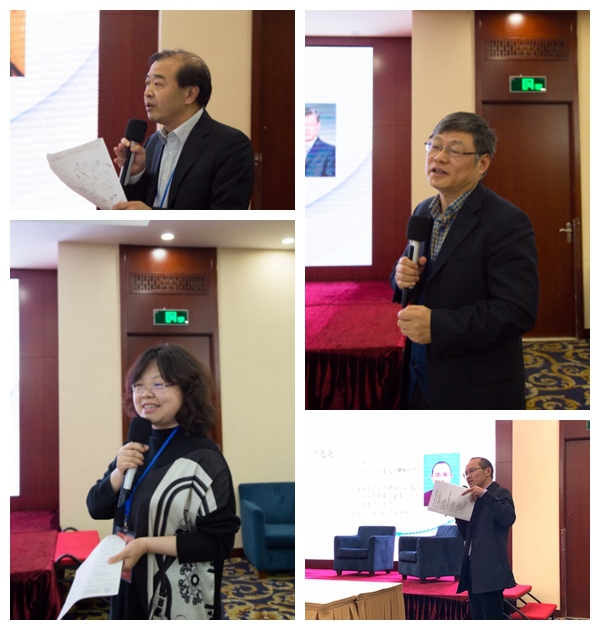
Discussions about the internet and social enterprises
The second session ended with a round table discussion attended by professors and experts from Tsinghua University, Tunghai University and Zhejiang Hongshi Foundation. They identified main issues on technology changing charity. For instance, western China regions still fall behind eastern China in both charity practice and internet technology, and social enterprises in western regions are confronted with special difficulties. More attentions should be paid to the increasing cost brought by blockchain in charity practice.
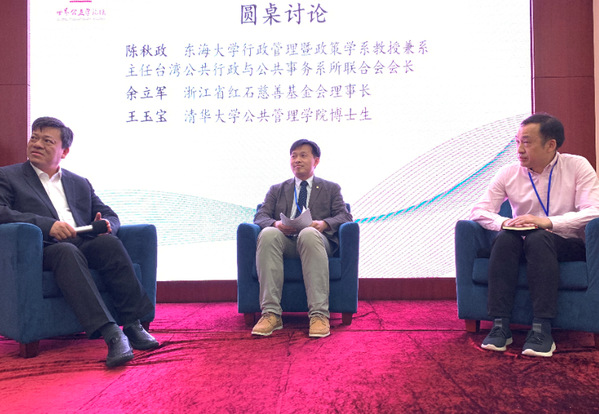
Round Table 2
The theme of the third theme forum was “social innovation and rural revitalization” presided over by Lan Yuxin, an assistant professor from Institute for Philanthropy of Tsinghua University. The session included two keynote speeches by Professor Chen Dingming from Dharma Drum Institute of Liberal Arts, and Dong Qiang, associate professor from China Agricultural University. Professor Chen Dingming delivered the first keynote speech entitled ‘Study of Social Innovation and Policy of Youth Returning Home’, showing that positive policies could motivate youth to return home. Besides, the results of policies might vary according to backgrounds of different cases, thus Professor Chen believed that systematic and flexible policies should be implemented.
The following discussion brought together four professors to discuss obstacles in motivating youth to return home and revitalize rural areas. Professor Liu Peifeng from Beijing Normal University focused on the active role of rural areas and agriculture in modern social development, and issues related to autonomy and villager rights. Jia Xijin, associate professor from Tsinghua University prioritized the reasons and purposes of encouraging youth to return home and analyzed the trend of technology, resources and talents flow. The other two professors respectively emphasized experience and innovation of rural development.
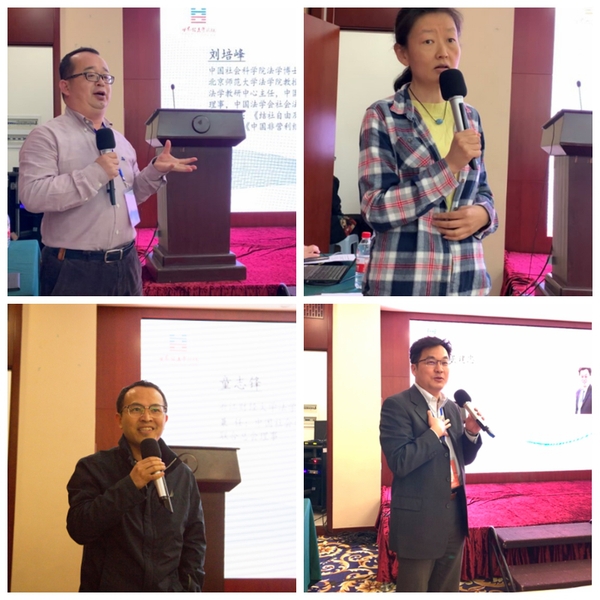
Discussionon the keynote speech by Professors Liu Peifeng (upper left), Jia Xijin (upper right), Tong Zhifeng (lower left), and Huang Jianzhong (lower right)
The second speech was about how philanthropy related to rural revitalization via social innovation. The speaker was Dong Qiang, an associate professor from China Agricultural University, mainly introducing an experimental philanthropy project carried out in a village in Shanxi province to alleviate poverty and develop local economy.
The case was highly accepted by several professors during the discussion session, due to the cooperation among scholars, governments and villagers. However, the data analysis, cost calculation and reproducibility of the project required further research. At the same time, professors believed that the preservation of local culture and customs should be taken into consideration.
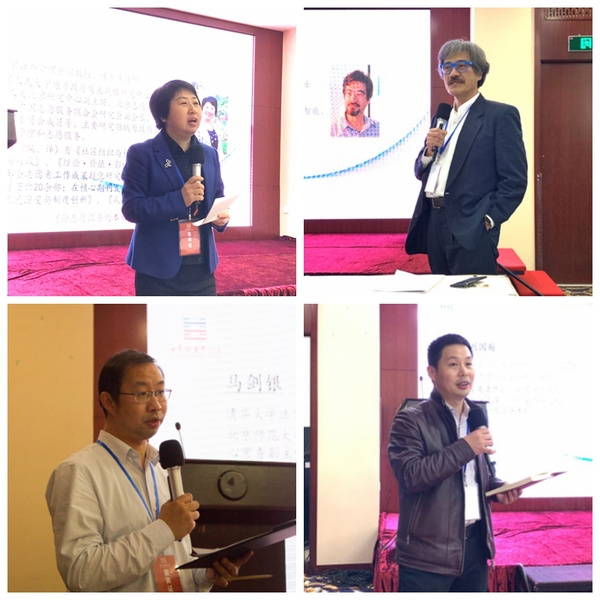
Discussion on the experimental philanthropy project in a village in Shanxi province
Resource is one of the key points in rural revitalization. Relevant issues were thoughtfully considered in the third round-table discussion. It is difficult for any single player to revitalize rural economy as a whole community; thus charity foundations could work as a bridge to reach more extensive markets. The integration of different resources was important and external resources should be utilized and localized to adapt to local development. Some experts also mentioned two potential risks in social innovation, namely the scarcity of scholars and the uncertainty of government power.
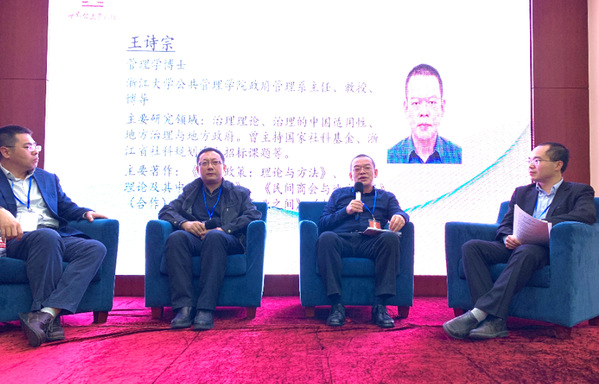
Round Table 3
The forum ended with a closing ceremony chaired by Professor Yu Jianxing, Dean of SPA, Zhejiang University and the Chair of Academy of Social Governance. Professor Wangming, the chair of Institute for Philanthropy of Tsinghua University and professor Feng Yan from National Taiwan University made a joint conclusion. This year’s forum brought together experts and professors from various fields, covered extensive themes and formed academic inspiration, which played a significant role in cultivating youth scholars as well as exploring the relationship between charity theory and practice.


